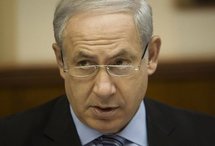White House insists Middle East talks making progress
AFP
WASHINGTON- The White House insisted Friday that US-brokered indirect Middle East talks were making progress, despite Palestinian complaints that the Israelis were stalling.
Senior US officials said they hoped to be able to move to direct talks between the two sides soon, though could not give a timeline, as they briefed reporters ahead of Israeli Prime Minister Benjamin Netanyahu's visit next week.

Israeli Prime Minister Benjamin Netanyahu
Washington sees the proximity talks brokered by US Middle East envoy George Mitchell as an interim step towards full direct talks between the two sides.
"It is hard to put a precise timeline on when that step could be taken," Shapiro said. "But we are encouraged by the progress that has been made."
On Monday, Palestinian president Mahmud Abbas offered Israeli newspapers a negative summary of how the talks have been going.
"We haven't received from Netanyahu even a single sign that might indicate progress," Abbas was quoted as saying by the Maariv daily.
"He has completely ignored everything we've raised," the paper quoted him as saying in comments made to Israeli journalists from four newspapers who spent the evening at his West Bank headquarters in Ramallah.
The indirect talks, which began on May 9 and are scheduled to take four months, are focusing on core issues including borders and security.
Netanyahu wants direct talks to begin but the Palestinian leadership first wants progress on recognizing borders of Palestinian lands and a halt to demolitions of Palestinian homes in east Jerusalem.
Netanyahu's visit is an attempt by both Israelis and the United States to put to rest perceptions of a rift between the two allies, after a frosty summit between Obama and Netanyahu, amid a settlements row, in March.
Netanyahu had been due to see Obama last month, but had to cancel the visit due to the crisis over the Israeli raid on a flotilla heading for Gaza.
This time, the Israeli premier will get all the trappings traditionally associated with a visiting foreign leader, including Oval Office talks, a question and answer session and photo op with reporters and a White House lunch.
"There is absolutely no rift between the United States and Israel," said Ben Rhodes, deputy national security advisor for strategic communications.
"This is a relationship first of all that is very strong and very important to the United States... our administration in partnership with the Israeli government has taken a number of steps to strengthen and deepen our cooperation."
Rhodes said the talks would focus primarily on the push for direct Palestinian and Israeli talks, but would also range onto regional security challenges like Iran.
Obama would also bring up the new Israeli policy easing restrictions on the goods that are allowed to cross between Israel and Gaza, which was adopted following global outrage at the Israeli flotilla raid.
"The president welcomed those changes which we think already are, and as they are implemented, will make a significant difference in the lives of people on the ground in Gaza," Shapiro said.
"I think the president and the prime minister really look forward to reviewing that progress."
----------------------------------------------------------------------